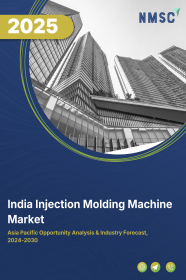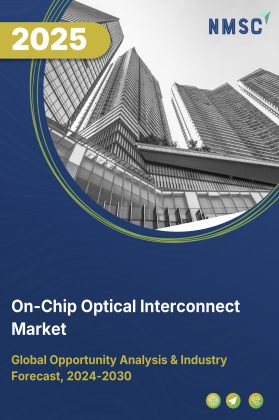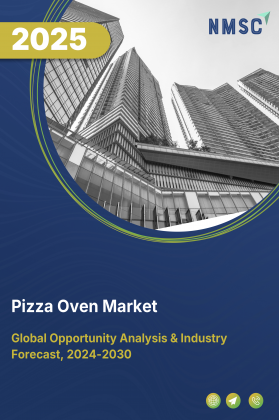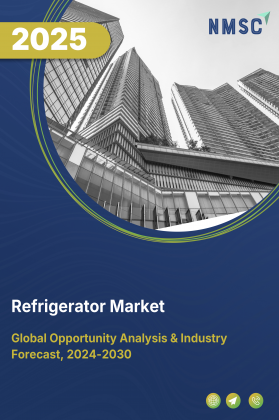
India Injection Molding Machine Market by Machine Type (Hydraulic, All Electric, Hybrid), by Product Type (Plastic, Rubber, Metal, Ceramic, and Other Product Types), by Clamping Force (Below 200 Tons, 200-500 Tons, and Above 500 Tons), by End User (Automotive, Packaging, Electrical and Electronics, Healthcare, Consumer Goods, Toy Making, Building and Construction, Home Appliances, Others), Business Type (New Sales, After Sales)–Opportunity Analysis and Industry Forecast, 2024–2030.
Industry: Semiconductor & Electronics | Publish Date: 31-Oct-2025 | No of Pages: 176 | No. of Tables: 136 | No. of Figures: 81 | Format: PDF | Report Code : SE1487
Market Definition
India Injection Molding Machine Market size was valued at USD 532.94 million in 2023, and is predicted to reach USD 888.15 million by 2030, with a CAGR of 7.2% from 2024 to 2030. An injection molding machine, also referred to as an injection molder, is a sophisticated industrial apparatus designed for the precise and controlled injection of molten plastic material into a mold cavity. It melts the plastic resin and forces it into a mold under high pressure. Injection molding machines are essential tools for producing various plastic parts and products across various sectors, including automotive, consumer goods, electronics, medical devices, and others.
Rising Preference for Lightweight and High-performance Manufacturing
In India, manufacturers across sectors are increasingly prioritizing lightweight and high-strength components to enhance efficiency, reduce energy consumption, and meet evolving product design demands. This shift is particularly evident in industries such as automotive, aerospace, packaging, and electronics, where component weight plays a vital role in performance optimization. Injection molding machines are ideally suited to meet this need due to their capability to handle complex geometries and produce precision-engineered parts using lightweight polymers and composites. The growing demand for lightweighting is pushing Indian manufacturers to upgrade their machinery, fueling innovation and accelerating adoption of advanced injection molding technologies.
Government Policy Support and Pli Schemes
The Production Linked Incentive (PLI) schemes are providing financial incentives to eligible companies based on incremental production, encouraging manufacturers to enhance their capabilities and invest in new technologies. The PLI scheme for automotive sector specifically encourages production of electric vehicles and will generate 750,000 direct jobs, directly boosting demand for injection molding machines.
Technological Integration Driving Smart Manufacturing
India's industrial landscape is undergoing a digital transformation, and the injection molding sector is no exception. Manufacturers are adopting technologies such as AI-powered process monitoring, real-time data analytics, and machine learning algorithms to ensure precision, reduce cycle time, and optimize throughput. Integration with CAD/CAM systems, automated material handling, and predictive maintenance features further enhance machine performance and reduce downtime. These advancements not only ensure consistent product quality but also lower operating costs. The integration of Industry 4.0 principles is enabling Indian firms to future-proof their operations and remain competitive in a rapidly evolving manufacturing ecosystem.
Technical Skill Gap and Operational Complexity
One of the key challenges facing the injection molding machine industry in India is the shortage of skilled professionals capable of managing and operating sophisticated machinery. As machines become more automated and technologically advanced, the demand for technically proficient operators and maintenance personnel is rising. Many small to mid-sized manufacturers face hurdles in recruiting, training, and retaining such talent. This skills gap can result in underutilization of machine capabilities, inconsistent product quality, and increased machine downtime—hindering the full potential of modern injection molding systems.
High Capital Investment and Financing Challenges
Advanced injection molding machines require substantial upfront investment, with small and medium-sized enterprises (SMEs) facing significant barriers due to high initial costs of machines featuring automation, IoT connectivity, and energy-efficient technology. Precision injection molding machines and robotics automation systems are expensive and SMEs lack the capital to invest upfront. The financing environment has become more challenging, with commercial lending rates remaining elevated and banks imposing stricter collateral requirements for machinery loans. Since changing technology involves huge capital investments and arranging such amount of capital is not possible for small and medium enterprises, many manufacturers are forced to continue with older, less efficient equipment, affecting their competitiveness and ability to meet modern production demands. This creates a cycle where SMEs struggle to upgrade technology, limiting their growth potential in an increasingly automated manufacturing landscape.
Surge in Demand For Customization and Short-run Production
India’s dynamic consumer market is witnessing a surge in demand for personalized and customizable products—ranging from automotive accessories and medical devices to electronics and household goods. This trend has led to the growing adoption of modular and hybrid injection molding machines capable of quick mold changes, short production runs, and flexible batch outputs. As product differentiation becomes a key competitive lever, manufacturers are investing in agile and adaptable molding systems that can cater to varied product specifications. This shift opens up vast opportunities for machine makers offering smart, scalable, and easily configurable solutions.
Competitive Landscape
The India injection molding machine industry includes several market players such as Nissei Plastic (India) Private Limited, Shibaura Machine India Private Limited, Electronica Plastic Machines Ltd., ENGEL Machinery India Private Limited, Bole Machinery, Negri Bossi (India) Private Ltd., Rajendra Plastic Industries, Milacron, LLC, Windsor Machines Limited, Haitian Huayuan Machinery (India) Pvt. Ltd., GS Hydraulics, Primex Plastic PVT Limited., India Plastic Machinery, Supermac Machinery and Thanusar Enterprises.
The India Injection Molding Machine Market Key Segments
By Machine Type
-
Hydraulic
-
All Electric
-
Hybrid
By Product Type
-
Plastic
-
Rubber
-
Metal
-
Ceramic
-
Other Product Types
By Clamping Force
-
Below 200 Tons
-
200-500 Tons
-
Above 500 Tons
By End User
-
Automotive
-
Interior
-
Trim
-
Exterior
-
Other
-
-
Packaging
-
Caps and Closures
-
Thinwall Containers
-
Lids
-
Personal Care
-
Containers
-
Pet Preforms
-
Other Packaging
-
-
Electrical and Electronics
-
Healthcare
-
Consumer Goods
-
Toy Making
-
Building and Construction
-
Flooring
-
Windows
-
Doors
-
Others
-
Home Appliances
-
Others
-
By Business Type
-
New Sales
-
After Sales
Key Players
-
Nissei Plastic (India) Private Limited
-
Shibaura Machine India Private Limited
-
Electronica Plastic Machines Ltd.
-
ENGEL Machinery India Private Limited
-
Bole Machinery
-
Negri Bossi (India) Private Ltd.
-
Rajendra Plastic Industries
-
Milacron, LLC
-
Windsor Machines Limited
-
Haitian Huayuan Machinery (India) Pvt. Ltd.
-
GS Hydraulics
-
Primex Plastic PVT Limited.
-
India Plastic Machinery
-
Supermac Machinery
-
Thanusar Enterprises
Report Scope and Segmentation
|
Parameters |
Details |
|
Market Size in 2023 |
USD 532.94 Million |
|
Revenue Forecast in 2030 |
USD 888.15 Million |
|
Growth Rate |
CAGR of 7.2% from 2024 to 2030 |
|
Analysis Period |
2023–2030 |
|
Base Year Considered |
2023 |
|
Forecast Period |
2024–2030 |
|
Market Size Estimation |
Million (USD) |
|
Growth Factors |
|
|
Companies Profiled |
15 |
|
Market Share |
Available for 10 companies |
|
Customization Scope |
Free customization (equivalent up to 80 working hours of analysts) after purchase. Addition or alteration to country, regional, and segment scope. |
|
Pricing and Purchase Options |
Avail customized purchase options to meet your exact research needs. |

















 Speak to Our Analyst
Speak to Our Analyst

























